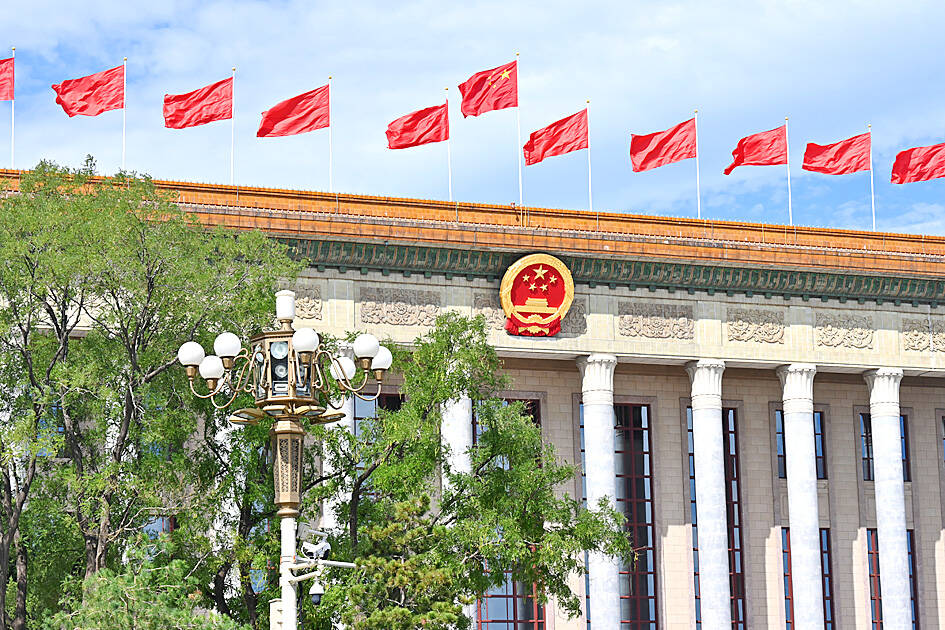The Mainland Affairs Council (MAC) yesterday protested what it called China’s "economic oppression" against Taiwan, after the Chinese Ministry of Commerce said earlier in the day that it is considering possible countermeasures because Taiwan has failed to remove trade barriers against goods from China.
In a statement, the MAC expressed regret over any such measures but said the government will continue its efforts to minimize any adverse effects they may cause.
The ministry said earlier yesterday that China is studying further trade measures against Taiwan.

Photo: EPA-EFE
The Democratic Progressive Party (DPP) has not taken any practical measures to lift "trade restrictions" on China, it said in a statement on its official Web site.
"At present, relevant departments are studying further measures based on the conclusions of the investigation into trade barriers from Taiwan” against China, it added.
On Thursday in an address marking Double Ten National Day, President William Lai (賴清德) said that the People’s Republic of China had no right to represent Taiwan, but that the nation was willing to work with Beijing to combat challenges such as climate change, striking a firm and conciliatory tone, but drawing anger from China.
The announcement from the ministry could portend tariffs or other forms of economic pressure against Taiwan in the near future.
China’s Taiwan Affairs Office, which on Thursday said Lai’s speech promoted "separatist ideas" and incited confrontation, responded to the announcement by saying the fundamental reason behind the trade dispute was the "DPP authorities’ stubborn adherence to the stance of Taiwan independence."
"The political basis makes it difficult for cross-strait trade disputes to be resolved through negotiation," the office said.
In May, China reinstated tariffs on 134 items it imports from Taiwan, after the Chinese Ministry of Finance said that it would suspend concessions on the items under a trade deal because Taiwan had not reciprocated.
The Cross-Strait Economic Cooperation Framework Agreement between Taiwan and China was initially signed in 2010, and Taiwanese officials had previously told reporters that China was likely to pressure Lai by ending some of the preferential trading terms within it.
Additional reporting by CNA

The Grand Hotel Taipei on Saturday confirmed that its information system had been illegally accessed and expressed its deepest apologies for the concern it has caused its customers, adding that the issue is being investigated by the Ministry of Justice Investigation Bureau. The hotel said that on Tuesday last week, it had discovered an external illegal intrusion into its information system. An initial digital forensic investigation confirmed that parts of the system had been accessed, it said, adding that the possibility that some customer data were stolen and leaked could not be ruled out. The actual scope and content of the affected data

DO THEY BITE IT? Cats have better memories than people might think, but their motivation is based entirely around the chance of getting fed Cats can remember the identity of the people who fed them the day before, Taipei-based veterinarians said on Friday, debunking a popular myth that cats have a short memory. If a stray does not recognize the person who fed them the previous day, it is likely because they are not carrying food and the cat has no reason to recognize them, said Wu Chou Animal Hospital head Chen Chen-huan (陳震寰). “When cats come to a human bearing food, it is coming for the food, not the person,” he said. “The food is the key.” Since the cat’s attention is on the food, it

A New York-based NGO has launched a global initiative to rename the nation’s overseas missions, most of which operate under the name "Taipei," to "Taiwan Representative Office (TRO)," according to a news release. Ming Chiang (江明信), CEO of Hello Taiwan, announced the campaign at a news conference in Berlin on Monday, coinciding with the World Forum held from Monday through Wednesday, the institution stated in the release. Speaking at the event, Democratic Progressive Party Legislator Huang Jie (黃捷) said she believed this renaming campaign would enable the international community to see Taiwan

TOO DANGEROUS: The families agreed to suspend crewed recovery efforts that could put rescuers in danger from volcanic gases and unstable terrain The bodies of two Taiwanese tourists and a Japanese pilot have been located inside a volcanic crater, Japanese authorities said yesterday, nearly a month after a sightseeing helicopter crashed during a flight over southwestern Japan. Drone footage taken at the site showed three bodies near the wreckage of the aircraft inside a crater on Mount Aso in Kumamoto Prefecture, police and fire officials said. The helicopter went missing on Jan. 20 and was later found on a steep slope inside the Nakadake No. 1 Crater, about 50m below the rim. Authorities said that conditions at the site made survival highly unlikely, and ruled